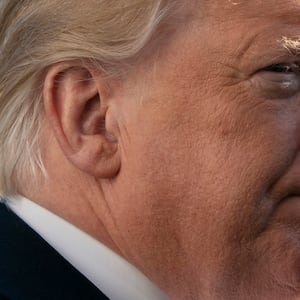Special Counsel Robert Mueller is expected to testify before the House Judiciary Committee as early as next week. What will he answer when asked about perhaps his most controversial decision: to decline to reach a conclusion on whether President Trump criminally obstructed justice?
Attorney General Bill Barr and Special Counsel to the President Emmet Flood have made it clear that they consider this a fundamental failure on Mueller’s part. Mueller will likely explain that given the unique position of the president in the American constitutional system, his choice was not only defensible but also necessary.
In a newly revealed letter sent a day after the Mueller Report’s release, Flood argued to Barr that because the decision to charge is a fundamental aspect of a prosecutor’s job, Mueller’s failure to do so constituted a political act, dangerous and inappropriate for the Department of Justice, a body that is supposed to apply the law to fact in an even-handed and nonpartisan way. Barr echoed this argument in the hearing before the Senate last week, claiming that it fell to him to decide whether the evidence in the Mueller Report constituted criminal obstruction of justice. That, he explained, is the one role of prosecutors: to investigate and decide whether to prosecute. Because Mueller supposedly failed in this aspect of his mandate, Barr himself had to fill in.
Flood and Barr are wrong, because they, unlike Mueller, fail to understand that the special counsel’s job is different from that of ordinary prosecutors in a fundamental way. As Mueller explained in his report, the Office of Legal Counsel within DOJ has concluded that a sitting president is immune from criminal prosecution, stating “under our constitutional plan… only the Congress by the formal process of impeachment, and not a court by any process should be accorded the power to interrupt the Presidency or oust an incumbent.” Mueller took this seriously and adapted the normal prosecutorial function to facilitate this constitutional requirement.
The Constitution gives Congress the authority to hold the president accountable by impeaching him for treason, bribery, “high Crimes and Misdemeanors.” Historically, this term has not been limited to or even defined by the penal code. It is a term of art that most historians believe denotes a serious abuse of power. By declining to determine whether or not Trump committed criminal obstruction, Mueller left it to the constitutionally appropriate branch to decide whether the conduct outlined in his report amounted to such an abuse.
But Congress cannot impeach and the American public cannot judge the president’s conduct without an accounting of the facts. So, the question remains, how to ensure that Congress can draw on the service of professional prosecutors to determine the facts necessary to carry out its constitutional obligation?
Our system of government has struggled to answer this question. In 1978, shortly after the Watergate scandal, Congress enacted the Ethics in Government Act, which created a congressional independent counsel whose job it was to investigate crimes by top executive officials. This post was held by Ken Starr, among others. The Supreme Court upheld this law but Congress nonetheless let it sunset amid concerns that the independent counsel was unaccountable to the American people. The special counsel regulations, pursuant to which Mueller was appointed, were a compromise, an effort to enlist an independent prosecutor in uncovering improper acts by top executive officials while maintaining checks on his work through limited oversight by the attorney general.
The special counsel regulations thus provide that an attorney general or his deputy can appoint a special counsel when the department itself has a conflict of interest and when the public interest so requires. The regulations go on to state that the special counsel must comply with DOJ policy and in his judgment, report periodically to the attorney general. As such, a special counsel is insulated from political influence but not unmoored entirely from accountability.
The role of the special counsel is to uncover facts in a neutral way so that the country can have faith in the outcome of the investigation and, if appropriate, Congress can deliberate on whether the evidence constitutes an impeachable offense. Where evidence falls in a gray zone in which prosecutorial judgment must be called upon, a conclusion that the evidence supported criminal obstruction would not bear on Congress’s ultimate work, as the impeachment inquiry is independent of whether a prosecutor deems he has sufficient evidence to prove a crime beyond a reasonable doubt. Nor would it be of any practical moment, as no actual charges could have been brought against the president by virtue of his office. And as Mueller explained, the facts did not allow him to exonerate Trump of obstruction charges. Despite all this, Barr felt the need to weigh in anyway.
No doubt if Mueller had engaged in what OLC called the “unavoidably political act” of rendering judgment on Trump’s criminal obstruction, the president and his allies would have accused Mueller of partisanship, by virtue of his drawing gratuitous conclusions. Pundits and politicians would have echoed Trump’s rhetoric and insisted that Mueller was engaged in a “witch hunt.” By declining to reach a conclusion on obstruction, Mueller managed to avoid such accusations and preserve the legitimacy of his investigation and the DOJ in general without depriving Congress of the information it needed to fulfill its constitutional duty.
Mueller’s understanding of the unique constitutional status of a president as the subject of prosecutorial investigation becomes obvious when we consider his report’s other major finding: the evidence did not establish a criminal conspiracy between the Trump campaign and Russians. That aspect of the investigation looked at many members of the campaign other than the president. And there was no constitutional bar to Mueller’s deciding whether those persons should be prosecuted. But the obstruction question related to the president alone, mandating a different approach.
Instead of following Mueller’s lead in preserving the investigation’s constitutional role, Barr unnecessarily plunged the Department of Justice into a political firestorm by opining on the question of criminal obstruction.
To be sure, by handing over the lightly redacted results of Mueller’s investigation to Congress, Barr served the purpose of the Constitution and special counsel regulations. But, by making his own call on criminal obstruction, Barr made a serious error. These regulations were specifically designed to remove the investigation of high executive officials from political appointees who may have a conflict of interest. Any decision by such appointees would lack credibility. The public would assume they were politically motivated. Barr is precisely such a political actor. His proximity to Trump makes any decision regarding the facts or law of the investigation suspect. By weighing in on an irrelevant point of law, Barr has done much to undermine the purpose of the special counsel and reverse the careful work of Mueller to uphold his mandate and the Constitution itself.







